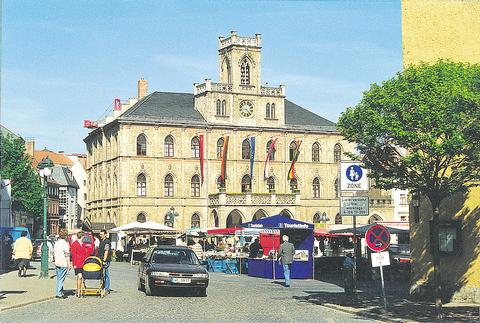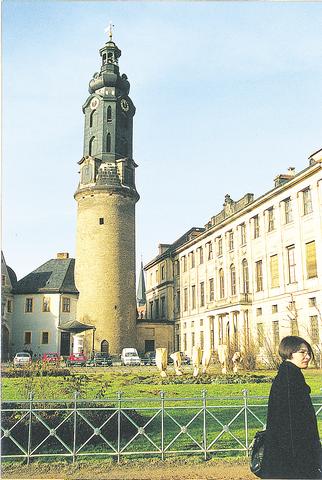The city of Weimar is located in the middle of Germany, in the state of Thuringia, which is also known as "the green heart of Germany." Every year the city, home to some 60,000 people, attracts thousands of visitors and is fast becoming a place of international dialogue focusing on history, mankind's origins and future. It is also turning into an important center for the development of ideas for the designs and hopes of a new Europe -- two years ago Weimar was chosen to be the Cultural Capital of Europe -- the first city in the former Eastern bloc to have that honor.
The city epitomizes the history of Germany and Europe: It was home and inspiration to classical poets, writers, composers and artists such as Goethe, Schiller, Liszt, Nitzsche, and the artists of the legendary Bauhaus. A trip to Weimar promises to be an experience in the culture, history and future of Europe.

PHOTO: TOURIST INFORMATION WEIMAR
The history of Weimar represents both a challenge and a responsibility. The town of poets, Fine Arts, the origin of political decisions, and more recently a place of National Socialist barbarity, is presenting itself and its inheritance in a wealth of events for discussions about the past, the present and the future. Recognition of the grand importance of the history of Weimar, is the inclusion of the cultural assets "Classical Weimar" in the world heritage list of UNESCO. The unique "genius huius loci" ("spirit of this place") is particularly important in attracting people from all over the world. The "Legend of Weimar," is the unique exciting relationship between intellectual greatness and communal spirit.

PHOTO: TOURIST INFORMATION WEIMAR
Poets, Philosophers
The town of classical German literature, the place where Goethe and Schiller, Wieland and Herder worked -- these are the images of Weimar for the majority of the visitors. For Friedrich Nietzsche, the philosopher, whose death's 101st anniversary is honored this year, Weimar was the last station in his life. Almost his complete estate is administered and maintained in the city. Johann Wolfgang von Goethe spent more than 50 years of his life in this town and famous works such as Goethe's Faust -- poetry, Iphigenia on Tauris and Egmont, Wieland's History of the Abredites or Herder's Letters of Humanity were created in, and emanated from Weimar. The glory of this history is reflected in the architectural imprint the period has left on the city.
Fine arts
Not only the written word but also fine arts raise Weimar to an outstanding position in European cultural history. The examples range from the old masters such as Lucas Cranach to Max Liebermann, one of the best known pupils of the "Weimar School of Art" (founded in 1860 as an art school supported by the Grand Duke Carl Alexander), to the modern Art of the state Bauhaus. The notion of Universal Art espoused by the Bauhaus, the impulses from Kandinsky, Feininger, Gropius and their artist colleagues were to revolutionize design and architecture, and are still having an effect to the present day.
The Weimar Art Collections unite the masterpieces of painting, sculpture and art craftsmanship throughout various epochs in the Palace Museum. Three years ago the Maenz collection was installed in the New Museum Weimar, paying homage to Modernism.
Music
Music heritage is also rich in Weimar and began with the great Johann Sebastian Bach. This year the 251st anniversary of his death will be celebrated. Some of his most important cantatas were composed in Weimar when he was concert master and court orga-nist.
Franz Liszt made Weimar the center of music in the 19th century when he was Court Director of Music. The College of Music in Weimar is named after him. Master's courses are held there each summer under the leadership of well-known international stars of the music world.
The Belvedere Palace houses a grammar school for music whose pupils already enrich the music program in Weimar today with their talents. The town is also home to an orchestra that is renowned not just in Germany but abroad as well.
Theatre
There has been a lively theatre culture in Weimar since the end of the 17th century. The theatre troupes were originally housed in the Royal Palace and then later made guest appearances in small private theatres. A permanent court theatre was founded in 1791 whose style and repertoire were directed by Goethe at first.
Its international rank was maintained throughout the centuries and this place of theatre culture has been home to the German National Theater since 1919. It is not only that great poets spoke on this stage but also great politicians in the shape of the founding fathers of the Weimar Republic, established in 1919. This connection of culture at the highest level to great historical events particularly enhances the theatre scene in Weimar.
Inspiration
Those who visit the many places of culture in Weimar will get to know the hospitality of the town as well. "Where can you find so much good in such a small space?" -- wrote Goethe. Words that are as true today as when their author lived, and describe the hospitality of Weimar at its best.
In catering however, whether Thuringian or international cuisine, whether serving sausages or haute cuisine, is where Weimar is at its best. The many bars, restaurants and cafes, often in an historical ambience, invite the guest to relax. If wishing to escape from the countless historical impressions in Weimar, the guest has a multitude of options for accommodation, in all varieties.
Landscape
Weimar is actually a town within a park. The town is surrounded by historical gardens and parks which envelop it like a green wreath. Formed by the landscape gardening of the 18th century the grounds still invite the visitor to stroll around. The path leads along the river Ilm from the Town Palace past Goethe's Garden House to the Baroque Palace of Belvedere. The landscaped park of the ducal summer residence with the Orangery is a yearly attraction to those interested in landscape architecture. Just outside the town is the park of Tiefurt Palace. The hexagonal white colonnaded temple at the center of the landscaped garden is dedicated to the Muse of singing Polyhymnia.
Around Weimar
From Weimar it's only a stone's throw to other beautiful and interesting cities such as Jena or Erfurt. The nearby medieval Thuringian Forest, where Charlemagne used to hunt over 1,000 years ago, gives you plenty of possibilities to walk and enjoy the unspoilt beauty of nature. In the state of Thuringia as a whole, you can also find plenty of old castles, palaces and historical sights each telling its own story and forming a unique link in the history of Germany. Visit website: www.weimar.de

EUROPEAN TARGETS: The planned Munich center would support TSMC’s European customers to design high-performance, energy-efficient chips, an executive said Taiwan Semiconductor Manufacturing Co (TSMC, 台積電), the world’s largest contract chipmaker, yesterday said that it plans to launch a new research-and-development (R&D) center in Munich, Germany, next quarter to assist customers with chip design. TSMC Europe president Paul de Bot made the announcement during a technology symposium in Amsterdam on Tuesday, the chipmaker said. The new Munich center would be the firm’s first chip designing center in Europe, it said. The chipmaker has set up a major R&D center at its base of operations in Hsinchu and plans to create a new one in the US to provide services for major US customers,

The Ministry of Transportation and Communications yesterday said that it would redesign the written portion of the driver’s license exam to make it more rigorous. “We hope that the exam can assess drivers’ understanding of traffic rules, particularly those who take the driver’s license test for the first time. In the past, drivers only needed to cram a book of test questions to pass the written exam,” Minister of Transportation and Communications Chen Shih-kai (陳世凱) told a news conference at the Taoyuan Motor Vehicle Office. “In the future, they would not be able to pass the test unless they study traffic regulations

GAINING STEAM: The scheme initially failed to gather much attention, with only 188 cards issued in its first year, but gained popularity amid the COVID-19 pandemic Applications for the Employment Gold Card have increased in the past few years, with the card having been issued to a total of 13,191 people from 101 countries since its introduction in 2018, the National Development Council (NDC) said yesterday. Those who have received the card have included celebrities, such as former NBA star Dwight Howard and Australian-South Korean cheerleader Dahye Lee, the NDC said. The four-in-one Employment Gold Card combines a work permit, resident visa, Alien Resident Certificate (ARC) and re-entry permit. It was first introduced in February 2018 through the Act Governing Recruitment and Employment of Foreign Professionals (外國專業人才延攬及雇用法),

‘A SURVIVAL QUESTION’: US officials have been urging the opposition KMT and TPP not to block defense spending, especially the special defense budget, an official said The US plans to ramp up weapons sales to Taiwan to a level exceeding US President Donald Trump’s first term as part of an effort to deter China as it intensifies military pressure on the nation, two US officials said on condition of anonymity. If US arms sales do accelerate, it could ease worries about the extent of Trump’s commitment to Taiwan. It would also add new friction to the tense US-China relationship. The officials said they expect US approvals for weapons sales to Taiwan over the next four years to surpass those in Trump’s first term, with one of them saying